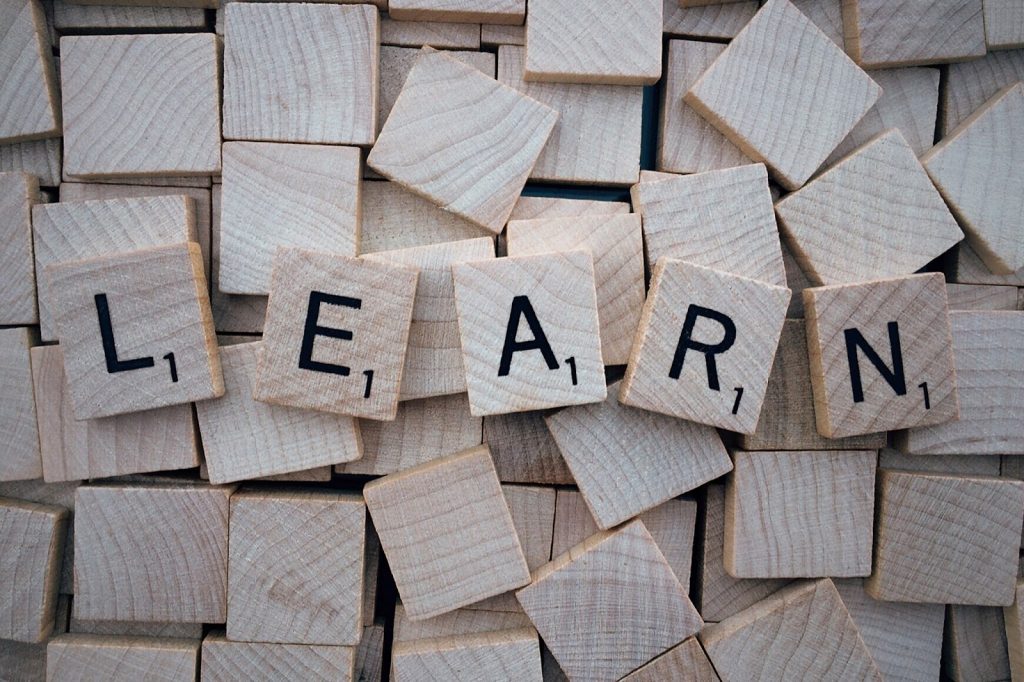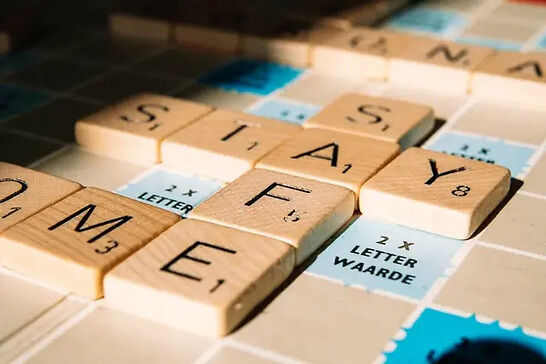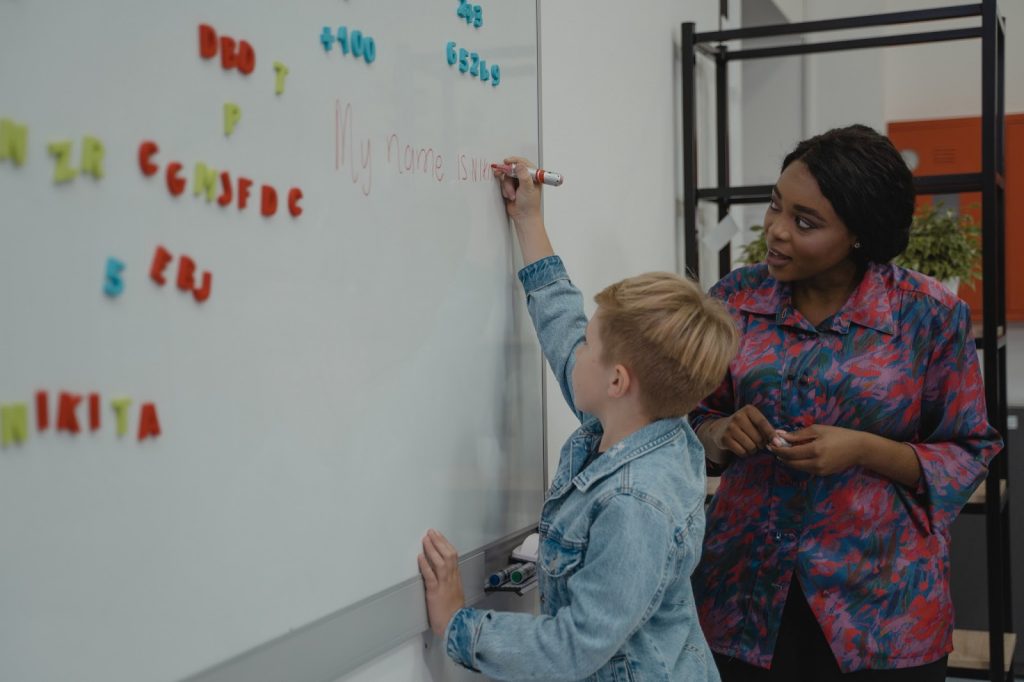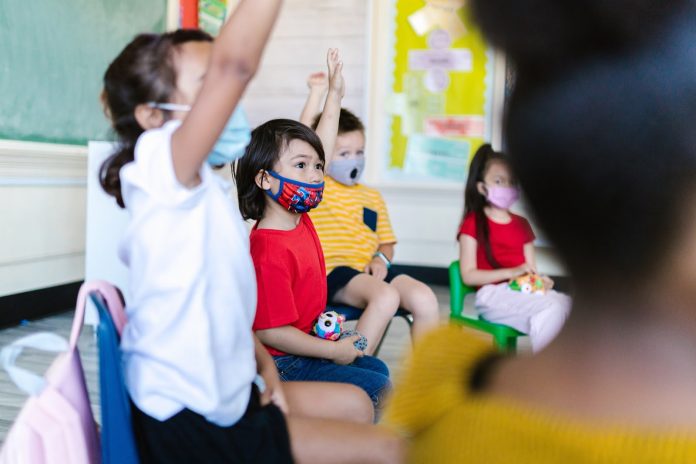If a bunch of kids were to come together and agree on what they find to be the most fun part of school and learning, likely, grammar wouldn’t likely emerge in that conversation. The English language rules don’t have to be the peas they set aside on their dinner plate (which they promise to eat after devouring everything else). Is there a fix? Yes!
Math & ELA | PreK To Grade 5
Kids see fun.
You see real learning outcomes.
Watch your kids fall in love with math & reading through our scientifically designed curriculum.
Parents, try for free Teachers, use for free
These English grammar games are here to help tilt the balance. Combining learning with playtime is a formula that can make learning grammar less frustrating and more, well, fun.
Related Reading: How Can Teachers Help English Language Learners
Grammar Games for Kids

If you’re searching for ideas to make grammar more appealing to kids, you’ve come to the right place. Let’s make learning grammar fun with this assortment of language games, activities, and ideas. Whether at home or in the classroom, these approaches are just the fix you’re looking for.
1. Educational Learning Games for Kids
Brought to you by Splashlearn, Educational Learning Games (ELA) for Kids is the perfect studying companion that promises kids an enjoyable and engaging approach to learning. It offers a dedicated reading and writing section with educational games, worksheets, and live videos. With so many different games, we’ll let you decide what your child may enjoy.
2. Roll a Sentence
Perfect for lower elementary students, this game lets students construct sentences by rolling dice. It can be helpful to keep a class supply of dice because they can be useful for many learning activities and games. This is how kids can use some dice to make constructing sentences a fun and rewarding learning game.
- Divide the participants into groups of two to four, and provide each group with two standard six-sided dice.
- Write twelve adjectives, verbs, places, prepositions, and nouns (persons/things) on 60 different flashcards. The back of the flashcards containing adjectives should contain the numbers 1 to 12. Repeat this with the other category of cards as well.
- The participants can take turns rolling the dice once before handing the dice to the next player. Every roll allows the participant to pick out a card from each category of cards corresponding to the number they rolled.
- After a total of five rolls, all participants should have a total of five cards, including one adjective, one verb, one place, one preposition, and one noun (either a person or a thing).
- The participants can now use their drawn cards to construct a logical sentence. This game can be adapted for more advanced learners by asking them to construct the sentence in twelve ways by adapting the verb tense.
3. A Game of Mad Libs
What if kids could steer the unraveling of a story by lending adjectives, nouns, and verbs to deliver stories that may not always make sense but promise a fun and engaging time? Regarding grammar games for kids, we can’t do without a game of Mad Libs. Perfect for learners of all ages, Mad Libs toes the line between fun and learning, unlike any other game.
- Mad Libs can be played in both small and large groups. One participant or a teacher can read through a Mad Libs story and invite participating students to provide a noun, adjective, or verb, depending on what the Mad Libs story asks.
- The participant or teacher can read the story once the story is complete and all the blank words have been filled out. This part of the game invites a lot of laughter, so be prepared.
- You can repeat the story with a different study leading the game and the other participants offer new words this time to give the story a different flavor.
- Once the words have been filled out, the leader can read out the story once more and bring back another round of laughter.
- And the cycle continues! When it comes to fun grammar games for the classroom, Mad Libs takes the prize.
4. Odd One Out
Free grammar games appropriate for learners new to the English language are aplenty, but this one certainly stands out. Odd one out is a great way to test how well students can recognize and determine the association between a set of words. Would new learners be able to recognize a noun from a grouping that contains two other verbs? You can’t go wrong with Odd One Out when it comes to grammar ESL games.
- You must prepare a few dozen flashcards with an equal number of nouns, verbs, and adjectives. If you’ve already tried out our first game on the list, you probably already have these flashcards prepared and can use those instead of making a set of new ones.
- You can start by laying out three cards in front of a student. Two of the cards must both be a noun, adjective, or verb. The third card must be a different kind of word. So if the first two cards that you lay out are nouns, the third must be an adjective of a verb.
- Ask the student to now pick the odd one out from the three cards you’ve laid out. This game is great for students to improve their understanding of the different kinds of words that are used to construct sentences and communicate.
- If you have learners learning other languages, such as Spanish or French, Odd One Out should work as another learning tool that can be utilized in these instances.
5. Grammar Headbands
What happens when you combine a popular party game with an element of learning? Grammar games online sometimes tilt too much, either on the learning side or on the fun side. But worry not because Grammar Headbands is here to help. It delivers a perfect balance between the two, but don’t take our word for it. Try it out with some young learners and see for yourself.
- If you’ve already played some of the games we’ve mentioned earlier and have prepared a deck of flashcards with words, you can skip to the next step. If not, all you have to do is prepare a deck of flashcards with a variety of simple nouns, adjectives, and verbs.
- Participants in this game can be divided into groups of two or more. All the cards should be flipped over and placed in a deck so the players can’t see them. The first player shall draw a card and place it on their forehead without looking at the word.
- The other player must now act out the word on the card. Depending on their grades, players can start with nouns and verbs before incorporating adjectives and adverbs.
Related Reading: Best Vocabulary Games to Play in Your Classroom
6. Simon Says (The Grammar Edition)
When it comes to grammar games for the classroom, a unique twist on Simon Says is tough to beat. Perfect for younger and new English language learners, this game employs a multi-sensory approach to learning. It uses movements to help participants develop a conceptual understanding of different kinds of words. Let’s get started.
- You can start by establishing the rules. All you have to do is ask participants to respond to different categories of words, like nouns, adjectives, and verbs, through different body movements.
- A tap on the nose can be established as the response participants must display in response to a noun. A jump on the spot can be a response to a verb, and a quick spin on the spot can be a response to an adjective.
- Once you’ve practiced with a few words to help the participants understand the response they must exhibit to the three categories of words, you can start trying out some new words. Encourage the participants to respond to the words as quickly as they can.
7. The Missing Punctuation Board Game

Mastering punctuation can be a pain, but it doesn’t have to be. How about a board game that brings more fun to the mix? This missing punctuation board game is about letting participants engage with sentences with missing punctuation marks and lending a hand to fix them.
- To start, prepare a deck of flashcards by making different punctuation marks on each card. Depending on the grades of the participants and their English proficiency, you can start with commas, periods, exclamation marks, and question marks before building up to include apostrophes, semi-colons, and colons.
- Prepare cutouts of sentences with missing punctuation marks while leaving some space between words where a punctuation mark would be appropriate. The sentences can make up a short story that the students are already familiar with, or it can be something they’ve never been exposed to before.
- Working in groups of two or more, students can take turns drawing punctuation mark flashcards from the deck before them and placing them where they feel a punctuation mark is necessary.
- Older students can even prepare their own sentences with missing punctuation marks and challenge their partners to add the appropriate punctuation marks before switching sides.
8. Grammar Bingo
Why wait for Bingo night when Grammar Bingo can come to you? Grammar Bingo sneaks a little learning into a popular game that most kids already love. This is the perfect grammar game for larger groups of students.
- Instead of a standard bingo board with numbers, you can replace numbers with the words verb, noun, adjective, and other categories of words depending on the participants’ age, proficiency, and grade.
- Once everyone has their boards, you can start drawing words from a box. The box should contain examples of the category of words on the Bingo boards. If you pull out the word run, for instance, students can cross out one box that contains the word “verb” from their boards.
- You can keep going on until someone screams, “Bingo!” Given how fun grammar Bingo can get, be prepared to lead a good number of games before the kids are ready to call it a day.
9. Crazy Adverbs
The perfect group game for more proficient English speakers, Crazy Adverbs is a fun take on charades. This game focuses on adverbs but can be adapted to work with just nouns or verbs for younger participants and ESL students. Let’s find out how it works.
- Prepare a deck of flashcards with one adverb on the front side of each flashcard. Start by having one participant draw a card from the deck and act out the adverb as best as possible.
- If the word they drew is “loudly,” the participant can try stomping their feet or clapping their hands as loud as they can to exhibit the adverb “loudly.” If the word were “quickly” they could try walking really fast, or spinning around as fast as they can.
- The remaining students should now try and guess the adverb that the participant that drew a flashcard is trying to exhibit. The student that gets it right first can be the next person to draw an adverb and act it out for their peers.
10. In Other Words
In Other Words is the perfect way to help kids develop their vocabulary. A game that’s suitable for both newer and more advanced speakers, In Other Words can be played in groups of two or more.
- All you have to do is divide students into groups of two or more. With this game, a group of two would be ideal.
- One of the students can start the game off by expressing a simple thought or a feeling. All they have to say is something like “I’m tired” or “I’m hungry.”
- Their partner now has to express these thoughts in different words. Their response can look something like this: “In other words, you’re sleepy,” or “In other words, you’re starving.”
Related Reading: Best Tips & Strategies to Teach English Language
11. Storyboards
Storyboarding is a process used in film production and involves creating a panel of images that are a visual representation of a film sequence. This essential tool in film production doubles well as an excellent grammar game. For this game, you need images that can be arranged in a logical sequence to form a story.
- Storyboarding is an activity that can be done alone or in groups. Students can start by arranging the images they have in a logical sequence.
- Once they’ve arranged the story in a logical sequence, they can describe the progression of the images as a story.
- To make this game more challenging, students can even try rearranging the images in a sequence different from the one they’ve already shared as a story, and see if they can describe a new story with this new sequence.
12. Slap
If you’re looking for a fun grammar game that introduces an element of competition, there’s nothing more exciting than Slap. All you need to do is fill your whiteboard with nouns, adjectives, and verbs that are large enough to be covered by the hands of the kids playing so that the words are large enough for them to “slap.”
- You can start by having two students stand in front of the whiteboard. You should share a sentence with them that’s missing a noun, verb, or adjective.
- The students now have to quickly find and slap a noun, verb, or adjective that can complete the partial sentence that was shared with them.
- The student that slaps an appropriate word first can continue in position for the next round, while a new student can replace their partner.
- This game can even be played amongst two teams, with each team working to secure the highest number of slaps before the end of the game.
13. Roll a Word
Developing vocabulary isn’t something that kids find particularly fun. However, throw some dice into the mix and you can turn this stale but important component of their language lessons into an exciting and fun-driven learning experience. This is a game that can be played individually, in pairs, or larger groups.
- All you have to do is prepare a list of six words on the whiteboard and provide each word with a corresponding number from one to six.
- Each group of two students can take turns rolling dice to get a word from the list on the whiteboard.
- They should use the word that they get in a sentence and write it down. Once they’ve used up all the words, they can share the sentences they have written with each other and even their other peers.
- To make this game last longer, you can make the list of words on the whiteboard even longer and provide kids with two dice to roll in one go. They can add up the numbers on the dice to select their word.
14. Synonym Scramble
Perfect for younger learners, Synonyms Scramble is a fun way for students to test their vocabulary. Requiring nothing more than a little mixing and matching of cards into pairs of synonyms, this game can easily be adapted for different age groups and proficiency levels. This game can be played individually or in pairs.
- Prepare a deck of flashcards with a noun written on one side of each card. Prepare another deck of flashcards with synonyms of the nouns that were prepared for the first deck. Ensure that you use a different color for each deck so they can be differentiated.
- Each student can start with two to three cards from either of the decks. They must examine and reveal a flashcard to each other at the same time. The players must rush to figure out whether the words are synonyms, and if they are, drop their flashcard from their hand.
- If the words are indeed synonyms, then the player that was slow or second to drop their flashcard must accept the dropped flashcard and put it aside with the corresponding word.
- The goal of the game is to end up with the fewest number of flashcards possible by the time all the words have been drawn or used once.
15. Grandmother’s Cat
Perfect for younger learners and beginners, Grandmother’s Cat offers students a way to practice their adverbs without any tools or preparation. It can work well in larger groups but can also be tried out in pairs.
- The first participant has to complete the sentence, “My grandmother’s cat is _____” with an adjective that begins with the letter “a.”
- Once they’ve had a go, the next player has to repeat the same sentence with a different adjective. The adjective that they choose should begin with a “b.”
- The third player, or the first player if it’s being played in pairs, should repeat this exercise with the letter “c.”
- The goal of this exercise is to work to the end of the alphabet, before modifying the sentence to make it more interesting.
- The next round can look something like “My grandmother’s cat likes to _____”, which would then take the focus of the exercise from adjectives to verbs.
16. Imaginative Adjectives
Another exercise suitable for younger learners, Imaginative Adjectives, tests their ability to provide attributive adjectives that can be placed before a noun. Like Grandmother’s Cat, all it requires are participants, their undivided attention, and some flashcards.
- Prepare a deck of flashcards by writing one noun on one side of the flashcards. Ensure that flashcards face the same direction in the deck so the words aren’t visible when the deck is face down.
- Appropriate for groups of two or more, have one participant draw a flashcard without revealing the noun on the flashcard to the others playing. The participants must now share an adjective to describe the noun on their flashcard to help the others guess it.
- If the flashcard they drew contains the noun “elephant,” they could start by sharing the adjectives “large” or “gray” and keep going until someone can guess the noun on their flashcard.
- If you’d like to make the game more competitive, participants can count the number of times they guess incorrectly, and the participant with the fewest guesses by the end wins. However, this would only work for groups of two.
- In groups larger than two, the winner can be the person with the most correct guesses.
Related Reading: Best English Games to Help Kids Practice & Master the Language Quickly

Let’s Get Learning!
If you were on the lookout for grammar games that promise a fun time without compromising learning, you’d love trying these in the classroom with your young learners. These games and exercises are appropriate for various learners and can easily be adapted to accommodate different languages, learning styles, and proficiency levels.
Frequently Asked Questions (FAQs)
Can any of these games be played individually by learners?
Many of the listed games don’t necessarily need to be played in pairs or larger groups. SplashLearn’s ELA for Kids also provides many grammar games that can be played individually.
Do grammar games offer any advantages as learning exercises?
Absolutely, traditional learning lessons can feel repetitive for students, and complementing them with some games can make learning more exciting and fun. Grammar games are a great way to deliver some learning disguised as playtime.






![100 True or False Questions for Kids [With Answers] True or false for kids](https://www.splashlearn.com/blog/wp-content/uploads/2024/10/true-or-false-for-kids-100x70.jpg)


